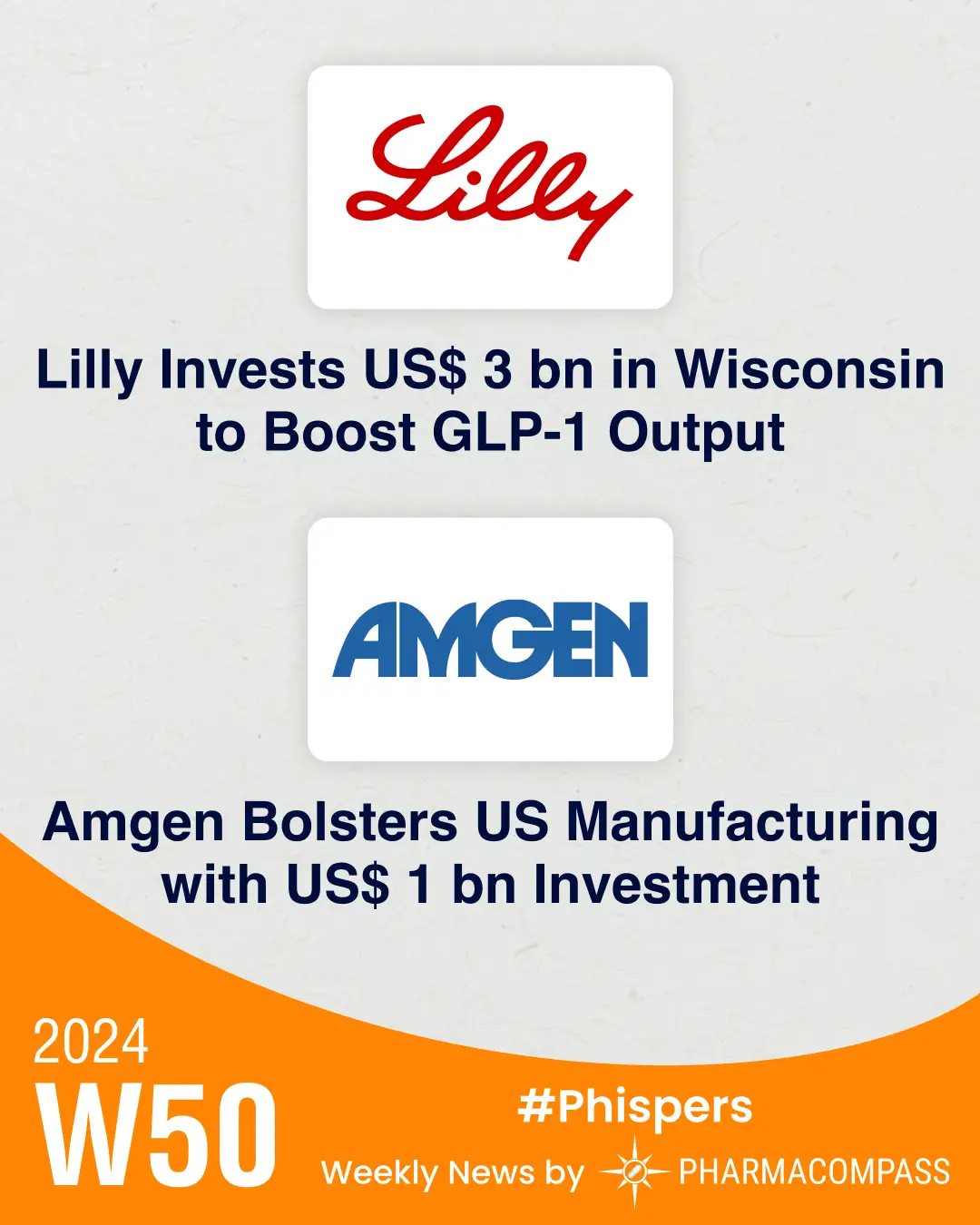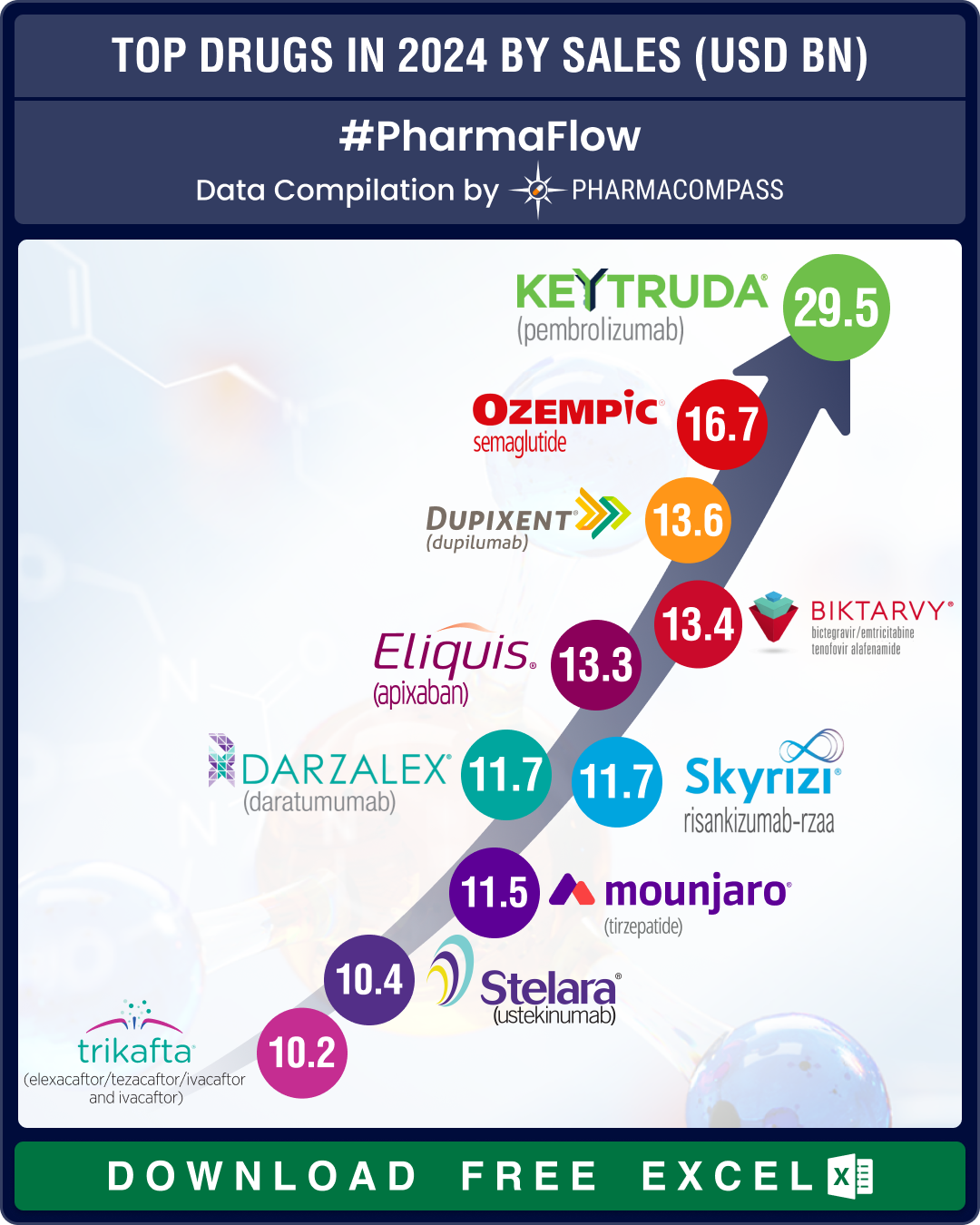
By PharmaCompass
2024-12-12
Impressions: 10,892 (Article) || 18 (Video)
In Phispers this week, Eli Lilly announced an investment of US$ 3 billion towards building a new plant in Wisconsin (US) to meet the soaring demand for its obesity and diabetes drugs, particularly Zepbound. Amgen is spending US$ 1 billion to expand its North Carolina (US) site, establishing it as a multi-drug substance facility with cutting-edge technologies.
GSK’s antibody-drug conjugate (ADC), Blenrep, staged a dramatic comeback, showing a 42 percent reduction in death risk for multiple myeloma patients compared to Johnson & Johnson's Darzalex, the world’s top-selling myeloma drug.
AbbVie’s Parkinson’s disease drug, tavapadon, from its Cerevel buyout met both the primary and secondary endpoints in a late-stage trial. In contrast, Relmada Therapeutics’ depression drug REL-1017 encountered a hat trick of phase 3 failures.
J&J and Legend Biotech’s Carvykti achieved a high rate of disease clearance in relapsed or refractory multiple myeloma in a phase 3 trial, reinforcing the CAR-T therapy’s potential to take on its competitors.
The US Food and Drug Administration (FDA) has outlined new guidelines for its accelerated approval program, emphasizing the need for confirmatory trials and the use of surrogate endpoints.
Lilly to invest US$ 3 bn in Wisconsin plant to meet soaring demand for GLP-1 drugs
Eli Lilly is investing US$ 3 billion to expand its recently acquired injectables plant in Wisconsin, driven by the surging demand for its obesity drugs. Construction on the 84,000-square-foot facility begins next year, and will house an additional 750 staffers on top of the 100 existing employees at the plant. This is Lilly’s biggest US investment outside of its home state of Indiana. Launched in late 2023, Lilly’s popular GLP-1 receptor agonist Zepbound (tirzepatide) has already raked in over US$ 3 billion in 2024, despite being in shortage for much of the year. Since 2020, Lilly has committed over US$ 23 billion to construct, expand and acquire manufacturing sites worldwide.
Amgen to invest US$ 1 bn in North Carolina: Amgen has announced a US$ 1 billion investment to expand its facility in Holly Springs, North Carolina. This expansion will establish a second state-of-the-art multi-drug substance manufacturing facility, bringing Amgen’s total planned investment in the area to over US$ 1.5 billion. The new facility will incorporate cutting-edge technologies and sustainable practices.
GSK’s Blenrep eyes US comeback after beating J&J’s Darzalex in trial
GSK’s cancer drug Blenrep (belantamab mafodotin), in combination with other treatments, has shown a 42 percent reduction in the risk of death for patients with relapsed or refractory multiple myeloma. The trial results, presented at the American Society of Hematology annual meeting, demonstrated that patients on the Blenrep combination (with bortezomib and the steroid dexamethasone) could potentially survive nearly three years longer compared to J&J’s Darzalex (daratumumab), the world’s top-selling myeloma drug. In 2022, Blenrep as a monotherapy had been withdrawn from the US market after failing a late-stage confirmatory study. GSK is now gearing up for five major new drug launches in 2025, including Blenrep, which is expected to have a peak annual sales potential of over £ 3 billion (US$ 3.83 billion).
AbbVie’s Parkinson’s prospect from Cerevel buyout hits late-stage endpoints
AbbVie said tavapadon, its investigational drug acquired through the US$ 8.7 billion Cerevel buyout, met the primary and secondary endpoints of a late-stage trial for early Parkinson’s disease. The success marked a hat trick of phase 3 victories for the once-daily treatment. It also comes about a month after the failure of emraclidine in a schizophrenia trial. Emraclidine was the centerpiece of the Cerevel buyout. Analysts noted that the tavapadon trial result “shows at least some payoff for the Cerevel transaction.”
New trial data bolsters J&J-Legend’s Carvykti position among other CAR-T therapies
J&J and Legend Biotech unveiled new data from a late-stage trial, demonstrating that their CAR T therapy, Carvykti (ciltacabtagene autoleucel), achieved a high rate of disease clearance in patients with relapsed or refractory multiple myeloma. After nearly three years of median follow-up, 89 percent of patients showed no detectable cancer cells after treatment, significantly higher than those treated with standard therapies. This data reinforces Carvykti’s potential, shrugging off concerns about its competitive position. A couple of days prior to the announcement of this trial data, Gilead Sciences and Arcellx had presented promising data on their CAR T therapy, anitocabtagene autoleucel (anito-cel), from a mid-stage trial.
Merck’s ADC achieves 100% response rate: Merck said zilovertamab vedotin achieved a remarkable 100 percent complete response rate in a mid-stage trial for previously untreated diffuse large B-cell lymphoma (DLBCL). This means that all patients who completed the treatment with the ADC in combination with R-CHP (cyclophosphamide, doxorubicin, prednisone, and rituximab) had no detectable cancer cells remaining. The trial results are particularly significant given the high bar set by the current standard of care, R-CHOP, which contains the same drugs as R-CHP along with vincristine, a chemotherapy. Merck had acquired zilovertamab vedotin through its US$ 2.75 billion acquisition of VelosBio in 2020.
Relmada scraps two late-stage trials of major depressive disorder drug
Relmada Therapeutics announced the discontinuation of two late-stage trials for REL-1017, a drug aimed at treating major depressive disorder (MDD), after an independent data monitoring committee’s analysis called the effort “futile”. The decision follows disappointing results from two earlier phase 3 trials, which failed to meet their primary endpoints. This setback has prompted Relmada to explore strategic alternatives, including partnerships, mergers, or an outright sale. The trials had aimed to evaluate the efficacy and safety of REL-1017 (esmethadone) as an adjunctive treatment with antidepressants for MDD, one of the most common chronic mental disorders in the US. Despite previously showing clinically meaningful and sustained improvements, the drug did not demonstrate the expected improvement in depressive symptoms compared to placebo.
FDA outlines new guidelines for accelerated approval program
FDA has outlined new guidelines for its accelerated approval program, aiming to clarify expectations for drug sponsors. These guidelines emphasize the need for confirmatory trials to be underway at the time of the accelerated approval and the use of surrogate endpoints to predict clinical benefits. The program, which has been in place for decades, has recently faced controversy due to several high-profile drugs receiving accelerated approval only to fail in subsequent confirmatory trials.
The PharmaCompass Newsletter – Sign Up, Stay Ahead
Feedback, help us to improve. Click here
Image Credit : Phisper Infographic by PharmaCompass license under CC BY 2.0
“ The article is based on the information available in public and which the author believes to be true. The author is not disseminating any information, which the author believes or knows, is confidential or in conflict with the privacy of any person. The views expressed or information supplied through this article is mere opinion and observation of the author. The author does not intend to defame, insult or, cause loss or damage to anyone, in any manner, through this article.”








